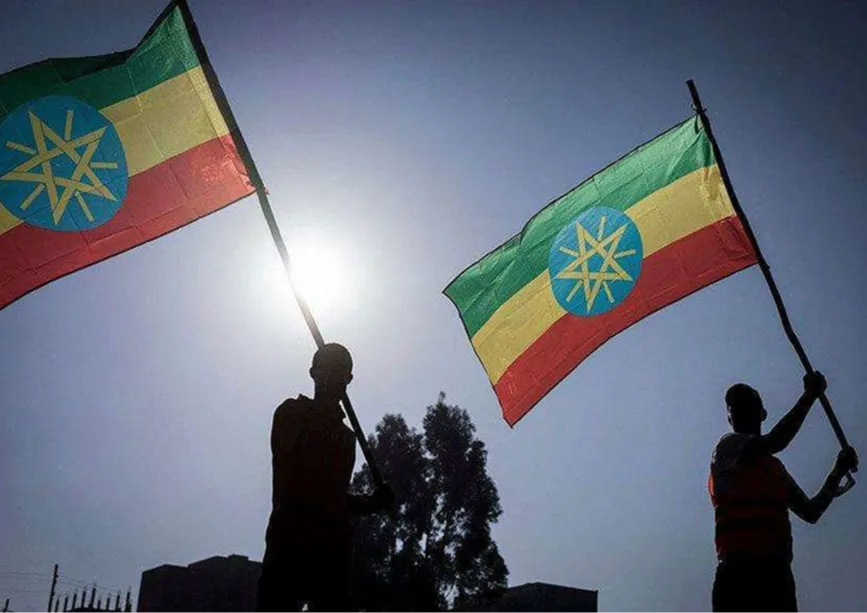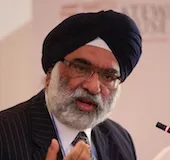
Among the surprises in geopolitics in 2023 was the expansion of BRICS. The six countries invited were Argentina, Egypt, Ethiopia, Iran, Saudi Arabia, and the United Arab Emirates (UAE).
Perhaps the most astonishing was the invitation to Ethiopia, an unlikely BRICS candidate. Having come in late, it then pursued the objective of being a part of BRICS relentlessly. As the second-most populous country in Africa and the 10th largest in terms of area, it saw in BRICS an opportunity to expand its stature.
Its neighbour and nemesis, Egypt, with whom it has a running contention over the Nile waters and the Grand Ethiopian Renaissance Dam (GERD) was a candidate. Ethiopia did not want to be left behind.
Joining BRICS raised its stature from being a poor country with an underperforming economy and internal strife.
In the wider context, Ethiopia had a poor economy partly due to its continuous civil war, splitting the country apart. Among the most promising economies in Africa, Ethiopia was now like a basket case. Joining BRICS raised its stature from being a poor country with an underperforming economy and internal strife.
Previously, Ethiopia was a darling of the United States (US) and the West for its fight against terrorism in Somalia. Now it remained isolated from the US due to the relentless pursuit of the war in Tigray, in association with its old enemy, Eritrea. The failure of US policy to restrict that war, its human rights concerns and the lack of a solution under US auspices annoyed Ethiopia's friends in Washington. This led to Ethiopia being suspended from utilising the benefits of the American Growth and Opportunities Act (AGOA) in January 2022. Ethiopia was riled. Ethiopia as a major beneficiary of AGOA, leveraged FDI, and expanded manufacturing exports through the development of special industrial zones. In 2020, of the US$525 million of Ethiopian exports to the US, half were duty-free under AGOA. These included garments, leather footwear, flowers, and vegetable products.
By demanding to join BRICS, Ethiopia conveyed to its Western friends that it had other options. BRICS was viewed as a Chinese-Russian-backed group by the West. Ethiopia played its cards well. It had the support of the 2023 BRICS chair, South Africa in its final leap to membership.
Nigeria, the most populous country in Africa, and Kenya, a stronger economy, were better candidates for BRICS. They would have brought regional balance to African representation in BRICS with South Africa and Egypt. It was determined pursuit of the BRICS dream by the Ethiopian PM Abiy Ahmed, who flew to South Africa at the invitation of President Ramaphosa and insisted that Ethiopia be included now, rather than await the criteria-based approach which the BRICS was evolving.
The failure of US policy to restrict that war, its human rights concerns and the lack of a solution under US auspices annoyed Ethiopia's friends in Washington.
The manner in which Ethiopia challenged BRICS decision-making led to BRICS accepting that they would establish a criterion for expansion, but then agreeing to admit six countries in what is now a premature exercise. Argentina has since declined the invitation and Saudi Arabia's enthusiasm is diminished, because it is not the sole addition to BRICS, but one among an additional five. The winner in this is clearly Ethiopia. Nobody seemed to ask what it would bring to BRICS besides a set of intractable problems.
Despite this success of getting a BRICS membership, Ethiopia is struggling with its economy. In December 2023, it became Africa's third defaulting country. It did not abide by its US$33 million payment on its sovereign bond. Its financial weakness due to the impact of the pandemic and the long civil war, which notionally ended in November 2022, left it in poor economic health.
Ethiopia joined Zambia and Ghana in a G20 common framework restructuring. In 2021, Ethiopia had sought relief under the G20 debt initiative. With reduced foreign exchange reserves, which have been a consistent problem in the country and high inflation, it bilaterally reached debt service suspension agreements with creditors, including with China and India. Ethiopia has US$28.2 billion in external debts, half of which are Chinese.
Nevertheless, according to the African Development Bank, Ethiopia's GDP is projected to grow at 5.8 percent in 2023 and 6.2 percent in 2024, mainly based on industry, consumption and investment. Inflation was at 34 percent in 2022. Due to high defence expenditure and diminished revenue collections, the fiscal deficit was 4.2 percent of GDP in 2022. Since Ethiopia sought debt restructuring in 2021, its sovereign rating was downgraded to CCC. This was not what BRICS was originally looking for in its members.
Inflation was at 34 percent in 2022. Due to high defence expenditure and diminished revenue collections, the fiscal deficit was 4.2 percent of GDP in 2022.
This has to be seen in conjunction with the internal strife in Ethiopia. The previously dominant Tigray went to war with Ethiopia after Abiy was honoured with the Nobel Peace Prize for rapprochement with Eritrea which was probably done with an eye on curtailing Tigrayan power. After two years of conflict, which ruined the economy. a peace agreement between Tigray and Addis Ababa is underway. The manner of its implementation allows analysts to call it a temporary arrangement. No economic benefit is ensuing from it. Meanwhile, the largest ethnic group, the Oromos are up in arms in parts and the Oromo Liberation Army and the Ethiopian government peace talks being held in Tanzania have been infructuous so far.
The Amhara, another dominant ethnic group, are also now restless. With the three main ethnic groups of Tigray, Oromo, and Amhara ready to violently contest how Ethiopia will progress, puts pressure on Addis Ababa, which however remains like an oasis of peace and development.
BRICS chose to ignore both the economic mess and the internal civil wars in Ethiopia while admitting Ethiopia. The value of Ethiopia to the West often had been as an ally in curtailing the Al Shabab radical and terrorist groups in Somalia. Ethiopia and Kenya were the main providers of troops under the African Union Mission to Somalia (AMISOM) in which Uganda and Burundi also played a role. Once Ethiopia and Eritrea patched up, they tried to reorder the geopolitics of the Horn of Africa diminishing the role of Kenya and Djibouti and consequently, of the Somali government in Mogadishu.
There is a new Ethiopia-Eritrea-Sudan access, but it did not last long because Sudan itself is in disarray. The most stable parts of the region are Kenya, Djibouti and Uganda but they are not pushing as hard as Ethiopia is for altering the geopolitics of the region.
Ethiopia and Kenya were the main providers of troops under the African Union Mission to Somalia (AMISOM) in which Uganda and Burundi also played a role.
Once Ethiopia was in BRICS and before their default, they set out a new ambition, of aggressively acquiring access to the Red Sea. Since Eritrea seceded from Ethiopia in 1993, Ethiopia became a large landlocked country. Initially, it was thought that it would continue to use the ports of Eritrea and they would have a common economic outlook. When Ethiopia-Eritrea went to war in 1998, the access that Ethiopia had to Assab and Massawa ports ended.
Over 20 years, Ethiopia invested heavily in Djibouti and its road and rail links to the port. This boosted the salience of Djibouti as an important port on the Red Sea. It improved with significant investments from the UAE and later from China. It is part of the reordering of the politics of the Horn of Africa that Ethiopia is now not satisfied with. It believes that Djibouti is getting congested and expensive.
In the past, Ethiopia, along with DP World—an Emirati multinational logistics company—had a Memorandum of Understanding (MoU) for investing in the port of Berbera in the autonomous region of Somaliland. For its outlet to the Red Sea, the Ethiopia-Eritrea rapprochement could have led to reopening the routes to Assab. Perhaps the partnership is tactical and lacks strategic depth. Therefore, Ethiopia seeks an alternative to Djibouti to the south and announced an agreement with Somaliland to invest in Berbera and offer Somaliland a stake in Ethiopia's profit-making Ethiopian Airlines as compensation.
Ethiopia, along with DP World—an Emirati multinational logistics company—had a Memorandum of Understanding (MoU) for investing in the port of Berbera in the autonomous region of Somaliland.
There is no way that the port and access can be developed by Ethiopia alone. Certainly, partners would have to be brought in whether the UAE or China however, this remains to be seen as Somaliland maintains links with Taiwan, not China. Moreover, Somaliland obtained from Addis Ababa, a guarantee that Ethiopia will recognise Somaliland as an independent entity. This has riled Mogadishu which has announced that such an agreement is invalid. It is clear that if Ethiopia merely wanted to build infrastructure to access the port of Berbera and expand it, it could have been done without trying to alter the geopolitics of the region.
The fact that Ethiopia chose to offer recognition of Somaliland, which nobody else has done so far, indicates that it is not merely its ambition to reach the Red Sea. It is also linked to its idea of reordering the geopolitics of the region and diverting attention from its internal problems by offering a national ambition.
Ethiopian dependence on Djibouti is unlikely to diminish anytime soon. Its relations with Somalia will depreciate and it raises the hackles of Djibouti, Kenya, and Uganda which wonder what Ethiopia is up to.
In its current situation, Ethiopia needs development support, debt relief, and FDI. Hopefully, BRICS will help it get support from the New Development Bank, China, Russia, India, the UAE, and Saudi Arabia. It hopes that this will tickle Washington to provide flexibility, restore AGOA benefits, and increase developmental assistance.
Gurjit Singh has served as Indian ambassador to Germany, Indonesia, Ethiopia, ASEAN, and the African Union. He is the Chair of the CII Task Force on Asia Africa Growth Corridor (AAGC).
The views expressed above belong to the author(s). ORF research and analyses now available on Telegram! Click here to access our curated content — blogs, longforms and interviews.




 PREV
PREV


